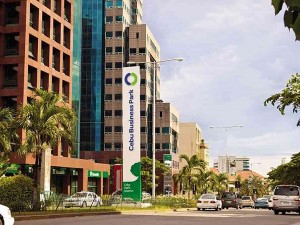
CEBU Business Park is a 50-hectare premier business and commercial district being operated by Ayala-owned Cebu Holdings Inc. CONTRIBUTED PHOTO
New business districts Circuit Makati, a 21-hectare development, and the 74-hectare Arca South—both by Ayala Land—recently joined the list of emerging business districts in Metro Manila as cited by Jones Lang LaSalle.
These two developments now join other new business districts the 15.4-hectare Uptown Bonifacio of Megaworld and the 10-hectare Veritown Fort by Federal Land.
With pockets of urban developments springing up, one question comes to mind: What do the next central business districts (CBDs) and emerging urban districts (EUDs) in the Philippines need to possess in order to match the economic magnitude of traditional Metro Manila CBDs?
Growth of EUDs
Claro dG. Cordero Jr., head of research, consulting and valuation of Jones Lang LaSalle, previously stated that the three major factors that have influenced the growth of EUDs in Metro Manila are cheaper real estate; the need for businesses to be near the source of labor; and the aggravation of the chronic traffic problem. Cordero said that EUDs in Cebu and Davao should clearly present these factors/alternatives to their target market.
“In order to attract the investors and locators, these EUDs should be well-planned communities (high-quality amenities, with long-term plans for traffic solution and management, and evolving/flexible development guidelines), in order for investors to be assured of their returns,” said Cordero.
He added that when investors are guaranteed with decent returns and real “value for money,” then they will continue to patronize that development. With these, he said, EUDs may well be able to match the economic magnitude of the established CBDs in Metro Manila.
Enrique M. Soriano III, Ateneo program director for real estate and senior adviser for Wong+Bernstein Business Advisory, cited in his previous lectures the concept of a place which would make a “great CBD.” Soriano defined his concept as follows: access and linkages (connected, walkable, convenient and accessible); comfort and image (safe, clean, attractive, historic, charming); uses and activities (fun, active, vital, special, real) and sociability (welcoming, cooperative and neighborly).
Transit-oriented dev’ts
Soriano also pointed out three factors for transit-oriented developments (TODs) to consider: design (pedestrian friendly), diversity (mixed use, mixed income, for as many people and activities as possible), and density (urban development not suburban).
Soriano cited that US data shows that in 2025 the TOD market could number 14.6 million households.
Soriano also mentioned an American Association of Retired Persons study that says 71 percent of older households would want to live within walking distance of transit areas. A Government Accountability Office Driving Life Expectancy Report, he said, shows more than 600,000 people aged 70 and older have ceased to drive each year and have become dependent on others for their transportation needs.
Circuit Makati, which is located at the former Sta. Ana Racetrack, will feature theater, event grounds, residential, mall and retail developments. Formerly known as the Food Terminal Inc., Arca South is seen as a 74-hectare mixed-use development.
Uptown Bonifacio, located near the Kalayaan Avenue and C-5 Edsa gateways, will feature mixed-use office, commercial and residential developments. Veritown Fort, located adjacent to Uptown Bonifacio, will house the Grand Hyatt Manila, Grand Hyatt Manila Residences, Park West, Central Park West and Madison Park West.
Aside from the Makati and Ortigas CBDs and Bonifacio Global City, the 26 emerging business districts in Metro Manila are UP Technohub, Eton Cyberpod Centris, Eastwood City, Araneta Cyberpark, Greenhills Redevelopment, Rockwell BPO Complex, Edsa Central, Robinsons Cyberpark, Rockwell Center, Century City, McKinley Hill, SM Mall of Asia Complex, Metropolitan Business Park, Newport City, Aseana IT Business Park, Asiaworld City, Madrigal Business Park, Filinvest Corporate City, Greenfield City, Eton City, Nuvali Canlubang, Arca South, Vertis North, Fairview Terraces, and Circuit Makati.